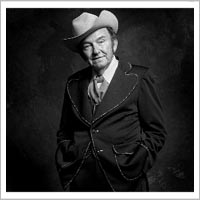By Don Jacobson
Boy, those classic country guys sure seem partial to using Chicago in their song lyrics. This time in Chicago In Song, two more of them, Lester Flatt and David Allan Coe, trot out the city in their ditties, in one case referencing Chicago’s supreme position as the trucking capital of the world, and in the other . . . well, as a drug-ridden hellhole.
I know. You just can’t escape the typecasting.
Lester Flatt/Backin’ to Birmingham
This is pure bluegrass novelty delight from Lester Flatt, who, by the time “Backin’ to Birmingham” came out on 1972’s Kentucky Ridgerunner LP (it was later re-issued in 2003 as part of the RCA Country Legends series) had split with Earl Scruggs and had formed a new band called Nashville Grass. Flatt was determined to stay true to the bluegrass ethic while Scruggs wanted to go in a more rock direction. History has proven that Flatt was the smart one.
 His early ’70s stint on RCA Victor was not an especially successful one commercially, especially when compared with the overwhelming popularity of his ’60s run with Scruggs – mostly thanks to the inexplicable Beverly Hillbillies phenomenon, which yielded bluegrass’ biggest-ever crossover into modern pop culture. But Flatt’s dogged adherence to Bill Monroe’s spirit during this time provided a crucial link to today’s modern bluegrass movement. His example gave young Baby Boomer fans such as Marty Stuart an example of principled devotion to traditional Americana at a time when pretty much all country music was being derided as cornball trash by anyone under 30.
His early ’70s stint on RCA Victor was not an especially successful one commercially, especially when compared with the overwhelming popularity of his ’60s run with Scruggs – mostly thanks to the inexplicable Beverly Hillbillies phenomenon, which yielded bluegrass’ biggest-ever crossover into modern pop culture. But Flatt’s dogged adherence to Bill Monroe’s spirit during this time provided a crucial link to today’s modern bluegrass movement. His example gave young Baby Boomer fans such as Marty Stuart an example of principled devotion to traditional Americana at a time when pretty much all country music was being derided as cornball trash by anyone under 30.
Stuart, in fact, joined the Nashville Grass in 1972 at the tender age of 13 as a mandolin-playing prodigy, in effect becoming part of Lester Flatt’s family and “attending” school via correspondence courses. I wasn’t able to determine whether Stuart played on this particular recording, but he certainly was performing it live with Nashville Grass shortly thereafter.
The Chicago connection with this song is a fairly common one in the Chicago In Song canon, which is the city’s status as a transportation hub. Probably next to being the home of the blues, the city’s image as an air, railroad and highway center is its most frequent function in popular song lyrics. I can’t tell you how many times I’ve seen lines like, “Thirty miles outside of Chicago, I thought about my baby and cried,” or “I was flying into Chicago at night,” etc., etc. Planes, trains, and automobiles, as John Hughes would say.
And trucks, as Lester Flatt would add. Chicago is the world’s largest trucking hub – there are 394,000 trucking industry workers in Illinois, one out of every 14 workers in the state. And the guy in this song was one of them, although not a very competent one. “Backin’ to Birmingham” tells the comic tale of a Chicago city slicker who wants to be a long-haul trucker:
Read an ad in Chicago’s Sunday paper
Help wanted, semi driver needed bad
I walked in I said I’d like to see the foreman
I told him all the experience that I had
He said, “Son, you’re just the man I needed”
Handed me the keys and shook my hand
He pointed to the truck and said, “I’ll see you
Take that load of steel to Birmin’ham”
The steel reference ties another Chicago industrial staple into the song. It’s very likely Lester had the steel mills of Gary or Hammond in mind when he wrote this ditty, which neatly ties together two of the main industries that made Chicago what it is – steelmaking and transportation. It’s like reading a trade magazine . . . only more entertaining.
Well I finally got inside and got it started
Put it into gear and started backin’ up
Tried every way to get it goin’ forward
Oh, but I ain’t never drove a big old truck
Well it wasn’t easy backin’ through the traffic
And I’ll bet I’m the first truck drivin’ man
That ever left Chicago in a semi
And backed it all the way to Birmin’ham
The route from Chicago to Birmingham takes the backwards driver through Nashville in Flatt’s song, so I’m kind of thinking he took Interstate 65 all the way. So that would also take him through Gary, on down to Indianapolis, past Louisville and right to Nashville, the home of Lester Flatt and the Nashville Grass! Coincidence? I think not.
David Allan Coe/Heaven Only Knows
After a brief detour through its considerable economic meaning, Chicago is back on its well-worn track as a metaphor for horrible human suffering and death in David Allan Coe’s “Heaven Only Knows,” from his great 2003 album and DVD, Live at Billy Bob’s Texas. It’s probably best described as a gritty, heartfelt ballad from an outlaw country legend who’s better known for more aggressive tunes like “Take This Job and Shove It.”
 In “Heaven Only Knows,” Coe, as masterful as always in the ways of the country song, writes something so damn country that you’re not quite sure if he’s making fun. I mean, he’s the guy who popularized the ironic song about what it takes to write the “perfect” country tearjerker, “You Never Even Called Me By My Name.” So, how can we be sure he really means the acres and acres of heartbreak in “Heaven Only Knows?” Well, at least on the Billy Bob’s album, he sounds like he means it.
In “Heaven Only Knows,” Coe, as masterful as always in the ways of the country song, writes something so damn country that you’re not quite sure if he’s making fun. I mean, he’s the guy who popularized the ironic song about what it takes to write the “perfect” country tearjerker, “You Never Even Called Me By My Name.” So, how can we be sure he really means the acres and acres of heartbreak in “Heaven Only Knows?” Well, at least on the Billy Bob’s album, he sounds like he means it.
The premise of the song is one man’s lament about the backwoods hellhole he lives in and how his ungrateful kids couldn’t wait to get out of there. But it turns out home ain’t so bad after all, as the young ‘uns find out. Daughter dreams of Hollywood, and guess what? She turns into a porn star.
You ain’t Daddy’s little girl anymore
Isn’t that a crying shame
With your dreams of California
Searching for your wealth and fame
I can still see the teardrops
Streaming down your face
I can still hear you say
There’s no future in this place
You thought you knew all the answers
When you were seventeen
Someone just sent me your picture
From some dirty magazine
And I’ve heard you made some movies
That I would not care to see
I just know how much I love you
And that don’t mean a thing to me
So there you’ve got your West Coast den of inequity. Porn. Sin. The rape of the innocent hillbilly girls. But wait, there’s another, Midwestern modern-day Sodom much closer to home as well, as the porn star’s brother found out after he, too, up and left rural America and lit out for the Big City.
I guess your brother felt the same way
I could not keep him on the farm
They found his body in Chicago
With a needle in his arm
I can still see the teardrops
Streaming down his face
And I can still hear him say
There’s no future in this place
A whore in L.A. A drug addict in Chicago. I’d say David Allan (or D.A.C. as he’s known) pretty much has a right to cry into his rebel flag. Chicago’s reputation as a drug-infested city of broken dreams has hardly ever been put so succinctly into a song lyric. But that’s what songwriters of great talent like D.A.C. do when they call upon the ghosts of the Windy City . . . they don’t just settle for run of the mill imagery. They find newer and better ways to make it seem even more terrible than ever before.
It’s this willingness to go over the edge that seems to set Chicago apart from other cities regularly referenced in song lyrics. I have yet to really explain it. There are other cities just as poverty-filled, drug-ridden and overflowing with heartbreak. New York, for instance. Yeah, there are certainly songs out there that bemoan those things about New York, but they’re more than balanced out by unending odes to Gotham’s many delights. So where are the delightful songs about Chicago? Do we have nothing to offer, delight-wise? Why aren’t there a half-dozen mega-hits about the Magnificent Mile, or romantic classics stretching back 50 years about Navy Pier?
Are we really so bad? Answer me that, and I will be forever in your debt.
*
Comments? Write Don.
*
From “Cubs ‘N Roses” to “The O’Hare Blues,” Chicago In Song explores the myriad and fascinating ways our fair city is portrayed in popular music. Check out the whole collection.
Posted on November 15, 2008


